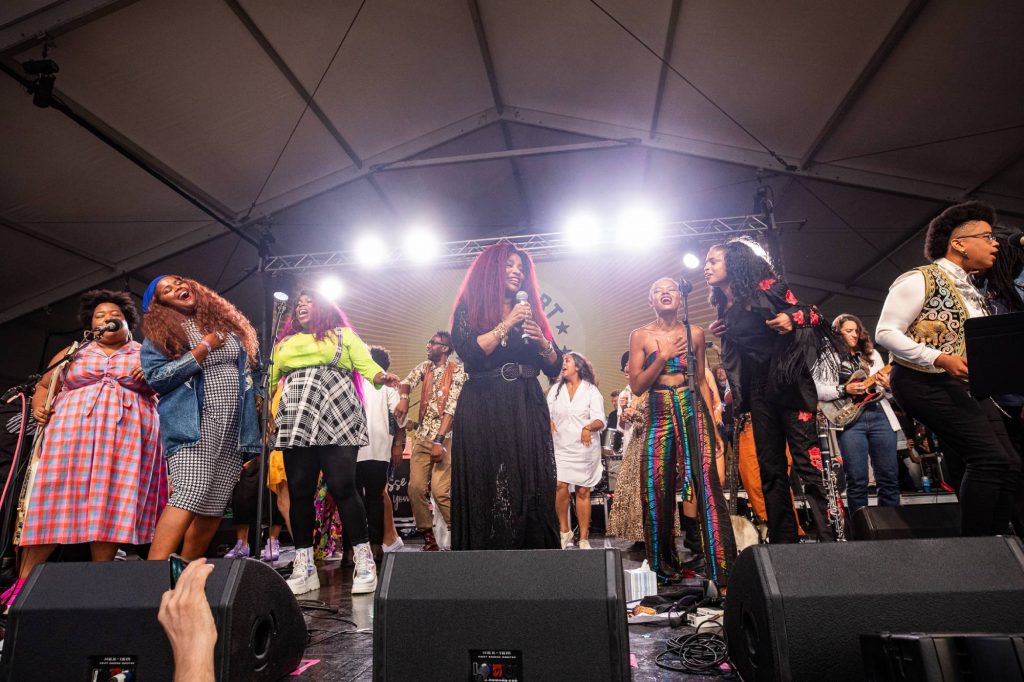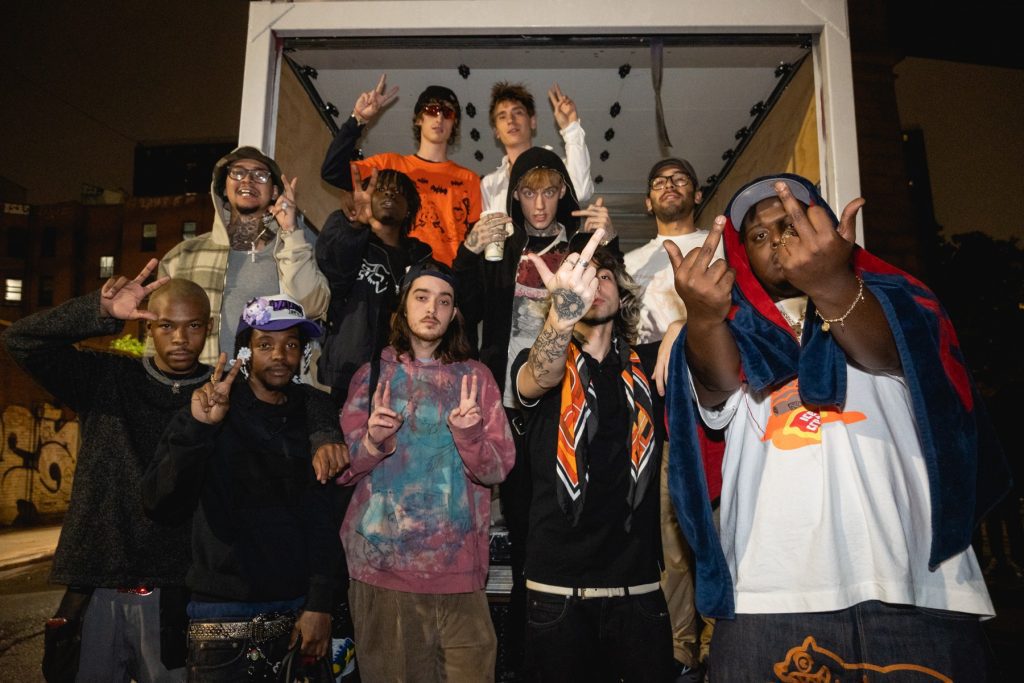
Lecrae’s Rap Contest Was Meant to Lift Up the Incarcerated. Did It Help Exploit Them Instead?
In late October, Lecrae was getting ready to announce the winner of a rap contest featuring the work of people behind bars. The contestants had submitted their entries in August, with the goal of becoming the one lucky winner, crowned by Lecrae, who would get their track recorded, mastered, and released.
“There are very few opportunities that give those locked up a sense of hope, and even fewer that encourage and recognize the level of musical talent that sits in our prison system — this contest does both, which is why I’m proud to be involved,” he said in a press release when the contest began.
Lecrae has a deep interest in social justice activism. Last year, the chart-topping Christian rapper partnered with Live Free USA to supply 70,000 masks to people behind bars in Georgia. He often gives speeches where he encourages youth behind bars to follow their dreams, and he toured the Georgia Juvenile Detention Center at the height of Covid-19 in the state. He’s also partnered with Prison Fellowship, a nonprofit that seeks to help people impacted by crime and incarceration, and given performances in corrections facilities.
blogherads.adq.push(function () {
blogherads
.defineSlot( ‘medrec’, ‘gpt-dsk-tab-article-inbody1-uid0’ )
.setTargeting( ‘pos’, [“mid-article”,”mid”,”in-article1″,”mid-article1″] )
.setSubAdUnitPath(“music//article//inbody1”)
.addSize([[300,250],[620,350],[2,2],[3,3],[2,4],[4,2],[640,250]])
;
});
But his latest venture has rankled criminal justice advocates. That’s because Aventiv, the company that sponsored his contest, also owns two companies called Securus and JPay, which provide digital communications and money transfer services for people in prison. Critics say the companies — as well as their main competitor, GTL — are exploitative middlemen that price-gouge inmates and their families.
“There’s one winner, but millions negatively impacted by the whitewashing he’s facilitating,” says Bianca Tylek, the executive editor of Worth Rises, a non-profit advocacy group working to dismantle the for-profit prison industry. “This is not what supporting incarcerated people looks like.”
According to Securus’ own SEC filings, prison communications technology is a $1.7 billion business. Documents provided by Worth Rises say that Securus makes its money by charging inmates fees on the order of $24.82 for a 15-minute phone call. (The company has also faced criticism for recording thousands of phone calls in New York City jails, including between attorneys and their clients, and in some instances sharing them with police and prosecutors.)
“The system just chews us up and spits us out,” one inmate told Worth Rises, according to the group’s materials. “They take everything possible from us and our families. My daughter spends what she could be saving to go to college to communicate with me.”
Just this month, the federal government’s Consumer Financial Protection Bureau ordered JPay to hand over $6 million in penalties for unfair practices related to its debit cards. “JPay siphoned off taxpayer supported benefits intended to help people transitioning out of the corrections system,” CFPB Director Rohit Chopra said in a press release. “JPay exploited its captive customer base to charge unfair fees that harmed the newly released and their families.”
When Worth Rises and other advocacy groups met with Lecrae and his team and explained their concerns about the contest sponsor, the rapper was shocked, according to Tylek: “He felt duped,” she says. The group hoped he’d call off what they view as a PR stunt for Aventiv, or at least distance himself from the contest. So far, he has not.
A representative for Lecrae tells RS that by the time he learned of these criticisms of Aventiv, he had already committed to showcasing the talents of the incarcerated people who participated.
blogherads.adq.push(function () {
blogherads
.defineSlot( ‘medrec’, ‘gpt-dsk-tab-article-inbody2-uid1’ )
.setTargeting( ‘pos’, [“mid-article2″,”mid”,”in-article2″,”mid-article”] )
.setSubAdUnitPath(“music//article//inbody2”)
.addSize([[300,250],[300,251],[620,350],[2,4],[4,2],[3,3]])
.setLazyLoadMultiplier(2)
;
});
“As an artist, I’m not the person who can fix the system, but I can use music to give people inside an outlet,” the rapper wrote in a detailed statement in response to questions from RS. “The lyrics I read from the 25 contest finalists far overshadow the voices of people who don’t know me or how personal this is for me.” He has also pledged to donate 100 percent of his compensation for participating in the campaign to nonprofit organizations devoted to helping incarcerated people and newly released people re-enter society.
On Oct. 29, music industry executive and criminal justice advocate Jason Flom decried the partnership. “Today, I’m making a pledge not to collaborate with corporations that profit from incarceration,” Flom wrote in Variety. “And I urge my fellow music executives and artists to join me. We will not do business with the prison industry because we must all be in the business of dismantling it.”
One formerly incarcerated man sent Lecrae an Instagram message calling his participation misguided. “If prison wasn’t for profit I would have been home 15 years ago,” the man wrote in a message obtained and shared by Worth Rises. “Instead I had to slaved [sic] for 23 years in prison for attempted murder, as a first offender.” This person decried the contest as giving false hope to incarcerated people, and added that a better way to help would be through structural changes like more humane laws, not stunts that might benefit a single person out of the millions and their families behind bars. “Don’t be stupid,” the message concluded.
In his statement to RS, Lecrae added that he feels the campaign has spurred hope among people behind bars. “Before I started this campaign, I reached out to some of my homies inside and to get their opinion about the contest and they all thought it was incredible!” he wrote. “They were excited about it, even asking if they can send me some sheets. Unfortunately, they’re at non-participating detention centers and they wanted to know if the program could be expanded.”
“This contest didn’t help one person,” he wrote. “It helped 500 people find their voice and know that someone cares, and someone is listening.”
blogherads.adq.push(function () {
blogherads
.defineSlot( ‘medrec’, ‘gpt-dsk-tab-inbodyX-uid2’ )
.setTargeting( ‘pos’, [“mid”,”mid-articleX”,”in-articleX”,”mid-article”] )
.setSubAdUnitPath(“music//article//inbodyX”)
.addSize([[300,250],[300,251],[3,3],[620,350]])
.setLazyLoadMultiplier(2)
;
});
While the contest’s winner will get to record their own track — whose lyrics must be “positive, without any curse words or gang references,” according to the rules — they won’t own the rights to it under the terms of the contest. And if the song is a hit, they’ll get none of the money: Instead, proceeds will go to programs that Aventiv says help reintegrate former prisoners back into society. But it’s not clear which groups will get the money; many halfway houses, for example, are controversial for onerous restrictions and alleged neglect and abuse.
The contest comes at a time when JPay and Securus are increasingly under fire for their allegedly exploitative practices. As Tylek explains it, Aventiv was created around 2019 as an umbrella corporation for the two companies, as a way of helping parent company Platinum Equity — an investment firm founded by Detroit Pistons owner Tom Gores — distance itself from the prison industry. When activists drew attention to Gores’ role in the prison industry to the Los Angeles County Museum of Art, where he sits on the board, Gores resigned, lamenting the unfairness of the campaign against his holdings. He told the Los Angeles Times that he was aware the company was courting “headline risk” and pledged that Platinum would act as a “change agent.” Now, according to a recent Bloomberg report, Platinum is looking to unload Securus. (Platinum did not respond to a request for comment for this story.)
A spokesperson for JPay tells IndieLand that the company provides families with an essential service. “We understand the importance of keeping loved ones connected, which is why we have prioritized efforts to make communications technology more affordable, while also balancing the needs of public safety,” the spokesperson says. “Through campaigns such as the Original Hip Hop Track contest, we’re also investing resources into driving awareness and applauding the talented individuals we serve.”
The representative acknowledges that the company has made mistakes in the past, and says that it has worked to make communications more affordable and accessible. “We know there is more work to be done, and our focus is on long-term sustainable change. Part of that change is acknowledging our past practices and mistakes, which are cause for the criticism we receive today. However, we will not allow criticism to hinder our progress or stop us from hosting contests that highlight and recognize the creative talents of the incarcerated we serve.”
blogherads.adq.push(function () {
blogherads
.defineSlot( ‘medrec’, ‘gpt-dsk-tab-inbodyX-uid3’ )
.setTargeting( ‘pos’, [“mid”,”mid-articleX”,”in-articleX”,”mid-article”] )
.setSubAdUnitPath(“music//article//inbodyX”)
.addSize([[300,250],[300,251],[3,3],[620,350]])
.setLazyLoadMultiplier(2)
;
});
Tylek doesn’t buy it. She argues that the lower average rates have more to do with states passing laws that make prison communications free — as Connecticut recently did, and as New York legislators are currently trying to do — than with any goodwill on the part of companies like JPay.
Other prison-communications companies have faced their own wave of negative publicity recently. The L.A. rapper Drakeo the Ruler recorded his entire 2020 album Thank You for Using GTL over that company’s phone lines during his incarceration on gang charges that were widely seen as the product of an overzealous prosecutor’s office. The album won acclaim with its detailed lyrics about life under police surveillance and for-profit predators preying on families desperate to maintain a connection with their loved ones behind bars.
Now another artist is offering his name to a company that’s faced similar criticism. “Exploiting families is never the route to providing hope,” Tylek says. “It just can’t be.”




